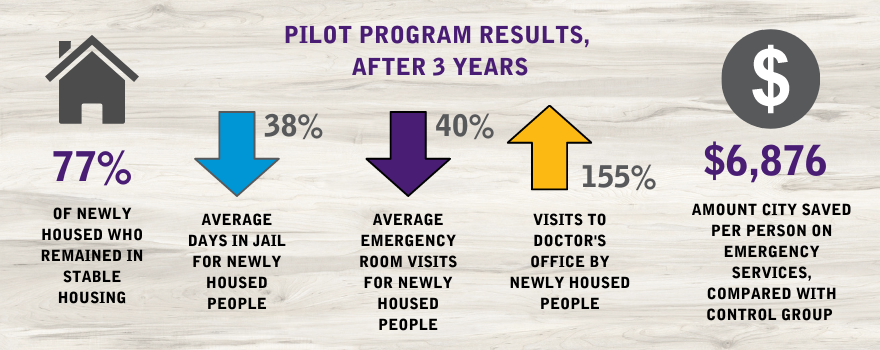Photo by Maria Ziegler
By Lisa Cirincione, Senior Resource Development Associate at Joining Vision and Action
As the City and County of Denver’s grantwriting consultant, Joining Vision and Action (JVA) gets to be a part of a lot of really exciting projects that help improve Denver residents’ quality of life.
One such City project is partially funded by the U.S. Department of Treasury through the Social Impact Partnership to Pay for Results Act (SIPPRA). The funding available isn’t a grant, but instead is “pay for performance.” In other words, if the City meets the outcomes that were agreed upon with the Treasury Department, it will be awarded a negotiated amount of money. If that kind of funding doesn’t make the argument for crafting ambitious yet attainable objectives in your grant proposals, I don’t know what will!
Another unusual aspect of this funding opportunity is that it was very broad in terms of the types of projects that SIPPRA could fund, as long as the projects demonstrate a benefit to federal revenues or a reduction in federal costs while improving social problems, e.g., increase employment, wages or financial stability for low-income families; improve family health and housing; or reduce recidivism.
JVA worked with the City and County of Denver on its SIPPRA application way back in 2019, but the Treasury Department took two years to make a decision about awards! This summer, Denver learned that it was one of only two awards made to date.
WAY TO GO ON CREATING SUCH A GREAT PROJECT, DENVER!
So, you’re probably wondering how the City is going to use the $5.5 million pay-for-performance award. Without further ado, let me tell you about that.
Housing to Health
Denver’s Housing to Health (H2H) project will serve 125 chronically homeless individuals that are referred to it through Denver Health and Hospital Authority or the Denver Department of Safety.
H2H aims to break the homelessness-jail cycle that many people who are unhoused find themselves in. This cycle costs the City a lot of money as people rotate in and out of jail, detoxification centers and emergency rooms. Instead, Denver wanted to offer supportive housing (a permanent housing subsidy and intensive, evidence-based and trauma-informed services) to help participants stay housed, using a Housing First approach.
Housing First programs meet participants where they are and do not make housing conditional on participants agreeing to receive any additional services, e.g., mental health treatment, substance use counseling, etc. The approach assumes that once people are stably housed, they can finally break free of worrying about their literal day-to-day survival and become able to focus on long-term goal-setting and accessing services to help them reach those goals.
The pilot study
H2H is based on a five-year pilot the City conducted with funding from a social impact bond. That was very helpful to the successful SIPPRA award, since the City knew a lot about the type of outcomes it could achieve with its proposed intervention. In the pilot, the City contracted with the Urban Institute to evaluate its impact. The Urban Institute used the “gold standard” for the evaluation—a randomized controlled trial—that included 723 people (363 in the treatment group and 360 in the control group).
The pilot showed that although providing supportive housing is expensive, it actually cost the City less than the City would have spent otherwise.
In fact, the City spent $6,876 less in total annual, per-person costs associated with providing emergency public services than it spent on those in the control group.
The results of the study were nothing short of astounding—Denver’s pilot showed that providing supportive housing, through a Housing First approach, could not only end chronic homelessness and help people find stability, but also reduce jail days and lower the public costs of the homelessness-jail cycle.
The study also repudiated the claim we sometimes hear about how “people on the streets are choosing to be homeless.” In Denver’s pilot, when people experiencing homelessness were offered housing, most took it, and 77% remained in stable housing for three years.
Denver’s pilot also reduced people’s interactions with the criminal justice system. People who received supportive housing had an average of eight fewer police contacts and four fewer arrests than those who received usual services. They also spent less time in jail. Over the three-year program, they had an average of almost two fewer jail stays and spent an average of 38 fewer days in jail than those in the control group.
Finally, Denver’s pilot also decreased people’s visits to emergency departments by 40% by increasing their use of office-based care to treat psychiatric diagnoses (office visits increased by 155%). Participants also experienced a 29% increase in access to prescription medication. In addition, there was a 65% reduction in participants’ use of detoxification facilities.
Expanding the program
Obviously, Denver wanted to expand this pilot to more people, so when the SIPPRA opportunity presented itself, the City applied.
The successful award will allow Denver to provide permanent supportive housing and services using a modified assertive community treatment model with wraparound support to 125 randomly assigned individuals experiencing homelessness who have a record of at least eight arrests over three years in Denver County, were unhoused for at least three of those arrests, and are at high risk for avoidable and high-cost health services paid through Medicaid.
The City is again partnering with the Colorado Coalition for the Homeless and the Mental Health Center of Denver to provide supportive housing, modified assertive community treatment and case management that includes evidence-based motivational interviewing and trauma-informed care.
The City is seeking private and philanthropic investors to provide upfront funding for the H2H project that will be repaid over time if certain outcome objectives are achieved. If the seven-year intervention can demonstrate a benefit to the U.S. government through a reduction in Medicare/Medicaid costs, it will receive a federal payment that allows it to use some of that funding to repay the City’s investors.
Denver will also pay investors if the intervention creates housing stability or reduces the number of jail days. The City contracted with Urban Institute to be the external evaluator to track data and calculate payments.
JVA congratulates the City and County of Denver on taking action to achieve its vision to end homelessness and is so pleased that we could play a role in helping the City secure its SIPPRA award. If you are interested in applying for a SIPPRA grant, there may be another round announced in 2022. JVA will be watching for that, so stay tuned!








Leave A Comment